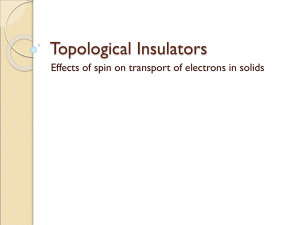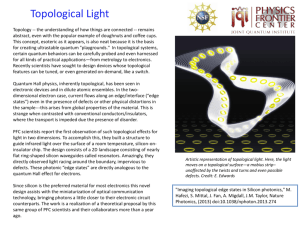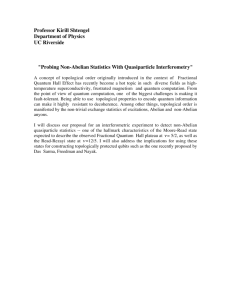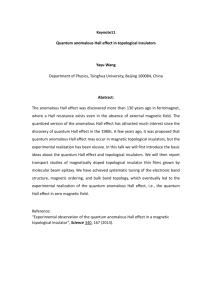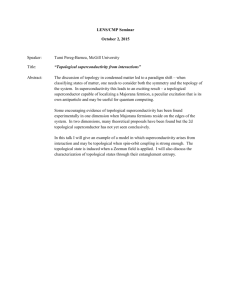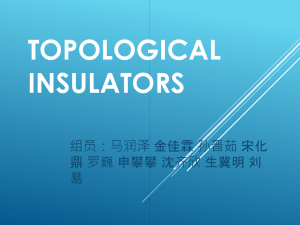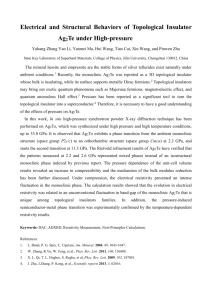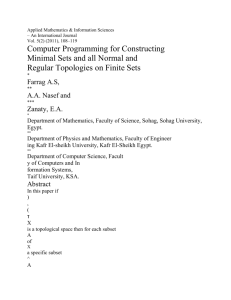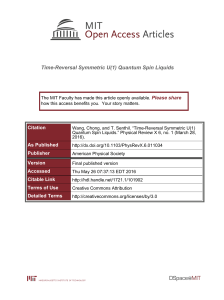Blue Lines and Gradients
advertisement
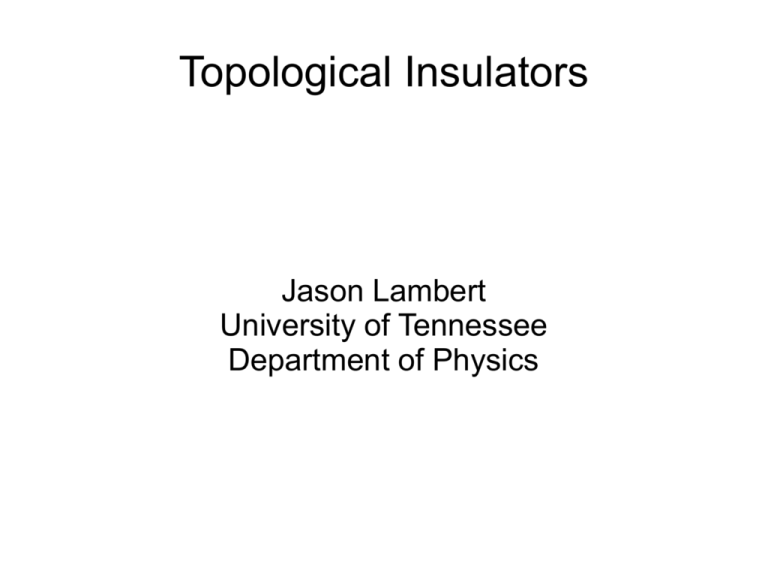
Topological Insulators Jason Lambert University of Tennessee Department of Physics Outline Topological Invariants and State of matter The Quantum Hall Effect ( QHE ) The Quantum Spin Hall Effect ( QHSE ) Experimental Realization QHSE Exotic Physics Prediction I predict that some worker in this field will win the big prize!!! Topological States of Matter M. Z. Hasan and C. L. Kane, arXiv(Febuary Topological States of Matter Topological classification Particle Hole Symmetry Chiral Symmetry Dimensionality Time Reversal Symmetry QHE QHSE The Quantum Hall Effect Discovered in 1980 by Klaus von Klitzing. Nobel Prize awarded in 1985. Extremely accurate resistance is now used as a NIST standard K. v. Klitzing, G. Dorda, and M. Pepper, Phys. Rev. Lett. 45, 494 (Aug. 1980) Quantum Hall Effect The resistance in the y direction quantized. xx xy yx yy Resistance in the xy direction goes to zero RH = h 25812.807557 = i e2 i Topological Invariant of QHE Topological invariant referred as the TKNN invariant. Determined from the integral of the Brillouin zone. The topology of the manifold of occupied states distinguishes the quantum hall state and conventional insulator n= 1 2 u ⟨ ∫ bz i 2 k ∣∇ k∣u k ⟩ d k M. Z. Hasan and C. L. Kane, arXiv(Febuary Quantum Spin Hall effect The QSHE effect has quantized conduction bands due to surface states. The electrons are spin polarized depending upon direction of flow. C. Day, Physics Today 61, 19 (2008) Quantum Spin Hall Effect Requires a linearly dispersing edge state also known as a dirac cone Bulk Valence and conduction bands are connected by the surface conducting states C. Day, Physics Today 61, 19 (2008) QSHE The surface states of the quantum spin hall effect are protected by time reversal symmetry There must be an odd number of dirac cones in the Brillouin zone. Is this a strong topological insulator? In three dimensional systems you can have both strong and weak topological insulators We want strong topological insulators. Determining the nature of the topological insulator is not trivial Easiest method works when material has inversion symmetry. Is this a strong topological insulator? ∏ m a = −1 =∏ a a 4 where = 0∨ 1 a= 1 L. Fu and C. L. Kane, Phys. Rev. B 76, 045302 (Jul. 2007) H. Zhang, C.-X. Liu, X.-L. Qi, X. Dai, Z. Fang, and S.-C. Zhang, Nat Phys 5, 438 (Jun. 2009) Experimental Realization Looking for materials that have a bulk insulating gap with strong spin orbit coupling. The spin orbit coupling should be strong enough to invert the highest valence band and lowest conduction band. Need to look toward heavy elements on periodic table spin orbit coupling is strong CdHgTe Quantum wells First topological insulator HgTe quantum wells. M. König et al., Science 318, 766 (2007). Second Generation Topological insulators Bi 2 Se 3 Sb2 Te 3 Bi 2 Te 3 H. Zhang et al., Nat. Phys. 5, 438 (2009). Y. Xia et al., Nat. Phys. 5, 398 (2009); D. Hsieh et al., Science 323, 919 (2009). Potential Applications Spintronics Room temperature dissipation-less conduction Because of the perfectly conducting edge state Possible applications topological quantum computing Table Top testing of the Standard Model Physics Exotic Majorana Fermions Unobserved in nature Nuetrinos? Predicted to exist in s-wave superconductor TI boundary Image Magnetic Monopoles Because of unique EM field theory that describes TI S.-C. Z. Xiao-Liang Qi, Physics Today 63, 33 (2010) F. Wilczek, Nature 458, 129 (2009); Nat. Phys. 5, 614 (2009). Conclusions Topological States of matter including the topological insulator have become a very Hot topic. The “second generation” materials have a lot of promise. Some topological insulator properties are very applicable Testing ground exotic physics and the standard model
